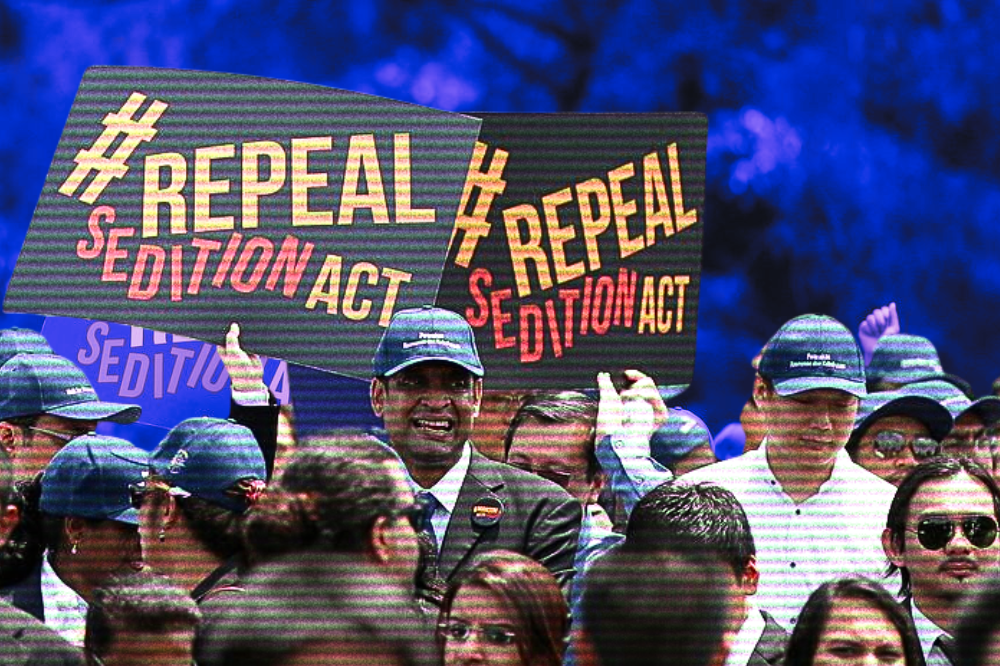Rethinking the Sedition Act: The role of race, religion and royalty in free speech
The act has long served as a contentious tool within Malaysia's legal framework, a relic of colonial rule designed to maintain "harmony.”

MALAYSIA often prides itself for the unique blend of culture, traditions, ethnicities and religions. But as we stand on the precipice of modernity with all its bells and whistles, a critical question bubbles to the surface: Are we prepared to leave behind the Sedition Act and, in doing so, embrace an era where freedom of speech thrives, even when it touches the sacred corners of race, religion, and royalty?
The Sedition Act has long served as a contentious tool within Malaysia's legal framework, a relic of colonial rule designed to maintain "harmony.” It gleams like a double-edged sword: offering protection and preserving societal peace on one side, while slicing through the heart of free expression on the other.
Of course we may debate on the notion of “freedom of expression” and “freedom of speech” as it is blatantly obvious that the Palestinian genocide is censured in some parts of the western world, while the wearing of the hijab is banned in others. But even if we agree that speech is indeed limited and to be exercised responsibly, where is the line separating constructive criticism and speech inciting violence?
Thus, with calls echoing across the political and social landscape to retire the archaic Sedition Act in Malaysia, we must seriously reflect on whether the rakyat is truly ready for such a paradigm shift and allow discourse to take place.
Criticism, when approached constructively, can be a catalyst for meaningful reflection and growth. A thriving society is one that is not afraid to question its norms and evolve.
After all, no political or religious leaders are maksum (free from sin). Yet, the transition from a controlled environment to an open forum is fraught with challenges, particularly in a country where race, religion, and royalty (the notorious 3R's) form the core of identity to a majority of the population.
Race and religion have always been sensitive topics in Malaysia. Our history of ethnic tensions and religious diversity demands a careful balancing act.
Can we foster an environment where discussing these deeply personal aspects doesn't lead to heightened tensions? Are Malaysians ready to see such critique not as an attack, but as an opportunity to evolve and address underlying issues?
As Tun Dr Mahathir Mohamad joked during a Pejuang event about potentially being investigated for touching on Malay rights, Machang MP Wan Ahmad Fayhsal Wan Ahmad Kamal wielded the same 3R narrative on Seputeh MP Teresa Kok over the recent halal certificate kerfuffle. Both of them, interestingly, oppose the government.
It is a vivid illustration of the subjective applications of the 3R, and its potential abuses in stifling opposing voices. If we accept the 3R to be used against political opponents, it is only fair for it to be used on allies as well.
Moreover, the royalty, an institution that symbolises the nation's historical and cultural continuity, is equally sacred. Recent cases of alleged seditious statements by political leaders such as by Kedah Menteri Besar Datuk Seri Muhammad Sanusi Md Nor and Perikatan Nasional Chairman Tan Sri Muhyiddin Yassin put a spotlight on how delicate the issue of 3R is.
The debate must go beyond jest and legal rhetoric. At its core, it is about defining national identity in a way that harmonises tradition with the exigencies of a modern, democratic society. Can all of us accept and grow from criticism that seeks the betterment of governance and transparency?
The task at hand is monumental. It requires nation-wide education and a deep cultural shift. Media literacy, critical thinking, and a strong legal framework that protects both speech and unity are imperative. Without these cornerstones, the dissolution of the Sedition Act may lead to more division.
Getting rid of the Sedition Act doesn't mean throwing caution to the wind. It means crafting a new social contract where Malaysians understand that responsible speech comes with the duty to foster unity and respect diversity. It means withholding from making exorbitant claims–such as Christianisation of Malaysia–unless backed by evidence.
Malaysia’s journey toward re-evaluating the Sedition Act is emblematic of a broader narrative: a maturing nation seeking its rightful place as a modern democracy. Are we ready?
The answer is complex. It involves introspection, maturity, and a collective commitment to fostering an environment where criticism is not merely tolerated but encouraged as a tool for nation-building.
As the echoes of the 3R resonate through the corridors of power, we must remember this: The strength of a nation lies not in the silence of its citizens, but in their ability to criticize constructively, and to envision a united future. Embracing that vision is Malaysia’s next great challenge.
Syaza Shukri, PhD, is an associate professor and the current Head at the Department of Political Science, IIUM. The views expressed in this article are the author's own and do not necessarily reflect those of Sinar Daily.










